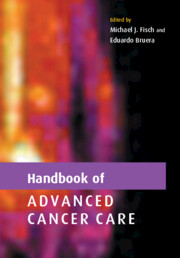Book contents
- Frontmatter
- Contents
- List of contributors
- Preface
- Acknowledgements
- PART I General concepts in oncology
- Part II Primary tumors
- Part III Management of specific symptoms and syndromes
- 41 Assessment of pain
- 42 Drugs for managing cancer pain
- 43 Difficult pain management problems
- 44 Dyspnea
- 45 Loss of appetite and weight
- 46 Fatigue
- 47 Depression and anxiety
- 48 Delirium
- 49 Constipation
- 50 Palliation of fever and sweats: the heat is on!
- 51 Bleeding in advanced cancer patients
- 52 Thrombosis
- 53 Hypercalcemia of malignancy
- 54 Lymphedema
- 55 Wound care of the advanced cancer patient
- 56 Infections in patients with advanced cancer
- 57 Urogenital complications
- 58 Brain metastases
- 59 Bowel obstruction
- 60 Bone metastases
- 61 Meningeal cancer
- 62 Pleural and pericardial effusions
- 63 Superior vena cava syndrome
- 64 Chronic nausea
- Index
- References
47 - Depression and anxiety
Published online by Cambridge University Press: 04 August 2010
- Frontmatter
- Contents
- List of contributors
- Preface
- Acknowledgements
- PART I General concepts in oncology
- Part II Primary tumors
- Part III Management of specific symptoms and syndromes
- 41 Assessment of pain
- 42 Drugs for managing cancer pain
- 43 Difficult pain management problems
- 44 Dyspnea
- 45 Loss of appetite and weight
- 46 Fatigue
- 47 Depression and anxiety
- 48 Delirium
- 49 Constipation
- 50 Palliation of fever and sweats: the heat is on!
- 51 Bleeding in advanced cancer patients
- 52 Thrombosis
- 53 Hypercalcemia of malignancy
- 54 Lymphedema
- 55 Wound care of the advanced cancer patient
- 56 Infections in patients with advanced cancer
- 57 Urogenital complications
- 58 Brain metastases
- 59 Bowel obstruction
- 60 Bone metastases
- 61 Meningeal cancer
- 62 Pleural and pericardial effusions
- 63 Superior vena cava syndrome
- 64 Chronic nausea
- Index
- References
Summary
Depression: An overview
Depression is a prevalent symptom in patients with advanced cancer. The reported rates of depression vary from less than 5% to greater than 50%, depending on how “depression” is defined and the nature of the patient population studied. The bulk of the data support an estimated prevalence in the 25–35% range. There are several inherent difficulties in diagnosing depression in this population. The most obvious problem is that sadness and grief are normal responses to the changes associated with the diagnosis of cancer and at transitional points in the disease. In addition, the physical signs of depression (such as fatigue, anorexia, sleep disturbance, etc.) may be attributable to malignancy itself. Finally, many of the medications used in advanced cancer patients may cause depression and/or physical symptoms. Due to these confounding issues, it can be difficult for cancer providers (and even behavioral health professionals) to distinguish depressed from nondepressed patients.
Distinct conceptual approaches: Symptom versus syndrome
Defining depression as a diagnostic syndrome (for example, using DSM–IV criteria) has some potential advantages and disadvantages when applied to advanced cancer patients. One of the advantages is that it enables clinicians to document the presence or absence of a depressive disorder in a reproducible fashion, and the existing data about the natural history and consequences of depression and appropriate treatment options generalize well to this population. The formal diagnosis of a depressive disorder may also be useful in order to establish appropriate reimbursement for management of this condition.
- Type
- Chapter
- Information
- Handbook of Advanced Cancer Care , pp. 382 - 389Publisher: Cambridge University PressPrint publication year: 2003



